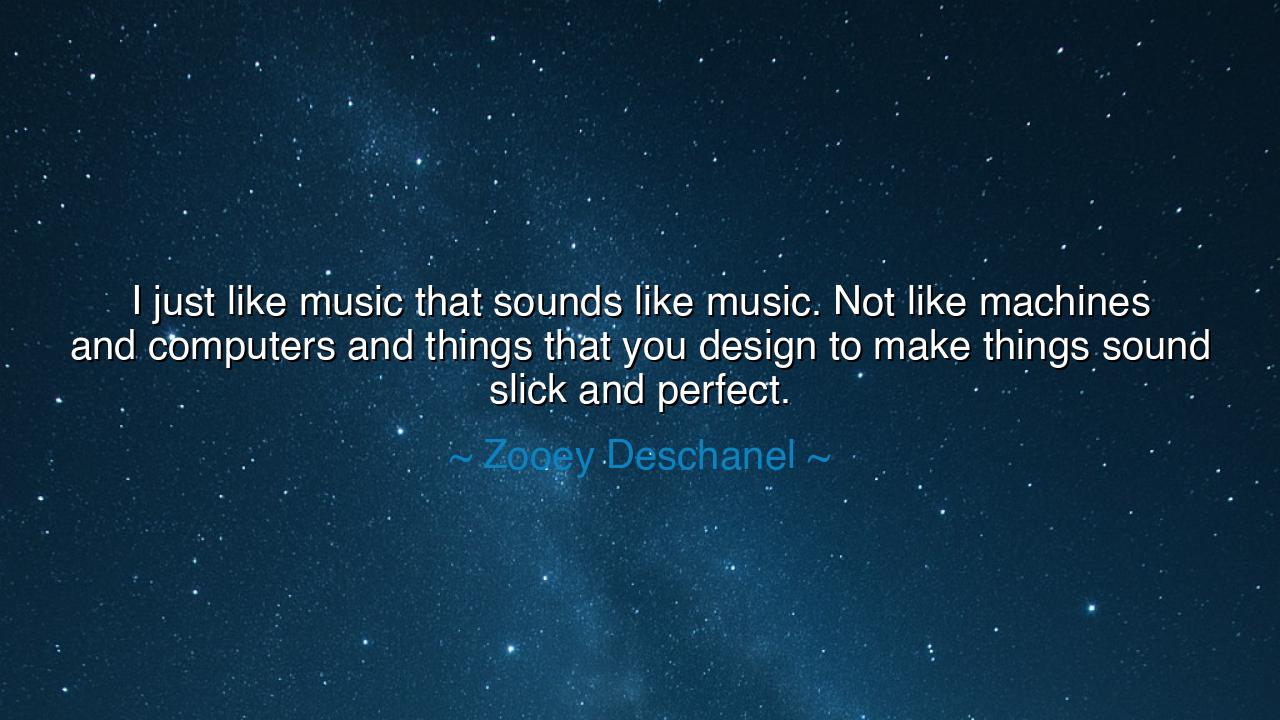
I just like music that sounds like music. Not like machines and
I just like music that sounds like music. Not like machines and computers and things that you design to make things sound slick and perfect.






“I just like music that sounds like music. Not like machines and computers and things that you design to make things sound slick and perfect.” Thus spoke Zooey Deschanel, an artist of warmth and authenticity in an age of polished artifice. Her words, gentle yet resolute, carry the fragrance of something ancient — a longing for truth over technique, for soul over simulation. In a world increasingly tuned to precision and perfection, Deschanel’s confession is not simply about music, but about the spirit of human creation itself. It is a call to remember that imperfection, the trembling edge of emotion, is what makes art truly alive.
In the ancient days, the poets and musicians of the earth understood this deeply. The lyres of Greece, the drums of Africa, the flutes of Asia — all were imperfect instruments, shaped by hand and played by heart. Their sounds were not flawless, but they carried the pulse of life, the breath of the player, the tremor of the human condition. To those who heard them, the beauty was not in perfection, but in presence. The song was a conversation between soul and sound. But in our time, says Deschanel, we have allowed the machine — precise, mechanical, unfeeling — to speak louder than the heart that created it.
Her lament is not one of rejection but of remembrance. She does not despise the computer, the tool of modern sound, but she warns of the danger that comes when the tool becomes the master. When music is “slick and perfect,” it loses the very imperfections that make it real — the quiver of a voice, the uneven strike of a drum, the silence between notes that breathes like a sigh. In those small flaws dwell the essence of humanity. Deschanel’s words awaken us to the truth that perfection is not beauty’s highest form — emotion is. For what good is a song that is flawless, if it leaves the heart unmoved?
Consider the story of Billie Holiday, whose voice was never technically perfect. It cracked, it faltered, it strained against pain and memory — yet it carried more truth than a thousand polished choruses. When she sang Strange Fruit, her voice shook like a leaf in the wind, but it cut through the soul of a nation. The machine can reproduce the sound, but it can never replicate the feeling. This, Deschanel reminds us, is the sacred difference between art and artifice. The machine may polish the sound, but only the human can breathe life into it.
Her reflection also speaks beyond music, into the very core of human life. In our world of digital faces and filtered realities, many have forgotten the beauty of the unpolished — the rough edges of real conversation, the pauses in thought, the unplanned laughter. We are surrounded by perfection, yet starving for sincerity. Deschanel’s love for “music that sounds like music” is thus a love for life that sounds like life — raw, unrefined, and true. She calls us to resist the seduction of artificial perfection and return to the sacred simplicity of authenticity.
In the echo of her words is also a quiet courage. To choose imperfection in an age of perfection is to choose vulnerability. It is to say, “This is who I am — flawed, but real.” The ancient sculptors of Greece left their statues unpolished, knowing that the touch of imperfection gave them soul. Likewise, the artist who dares to let her music — or her life — remain imperfect offers the world something greater than beauty: honesty. Deschanel’s voice is not merely artistic; it is moral, urging us to find grace in the genuine, to value expression over effect, and truth over gloss.
So, dear listener, take her wisdom as your own. Do not fear imperfection. In your art, your work, your words, let the cracks show — for light enters through them. Use your tools, but never let them replace your touch. Seek sound that stirs, not sound that shines; seek connection, not applause. For the world does not need more perfection — it needs more humanity.
Thus, remember Zooey Deschanel’s humble truth: music should sound like music, and life should sound like life. Let your voice tremble if it must, let your rhythm falter, but let it be yours. For the song that moves the heart is not the one that is perfect, but the one that is alive.






AAdministratorAdministrator
Welcome, honored guests. Please leave a comment, we will respond soon